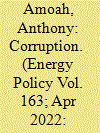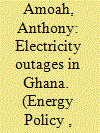| Srl | Item |
| 1 |
ID:
183620


|
|
|
|
|
| Summary/Abstract |
Increasingly, a significant part of the literature on corruption establishes a negative relationship between corruption and economic variables. However, empirical research showing the influence of corruption on renewable energy consumption is useful because of the global interest in achieving a low-carbon and clean environment. In this light, we model a relationship between corruption and renewable energy consumption (% of total final energy consumption) in Africa. Using a panel dataset for 32 African countries covering the period 1996–2019, we first show that perception about corruption is relatively high in Africa. In line with corruption theory, both Generalized Method of Moments and Instrumental Variable estimation techniques are used to establish that corruption is inimical to the share of renewable energy consumption in total final energy consumption in Africa. To investigate the robustness of the results, we disaggregate the sample into high and low environmental performance countries as well as upper and lower-middle-income countries and still find consistent results. Our results call for strategic policies and institutional structures that seek to prevent corruption from further permeating the continent's administrative structures.
|
|
|
|
|
|
|
|
|
|
|
|
|
|
|
|
| 2 |
ID:
169877


|
|
|
|
|
| Summary/Abstract |
African countries experience persistent and serious energy outages, but while multiple valuation studies provide estimates of the costs of electricity outages in high-income countries, evidence is scarce for lower- and middle-income countries. The few studies that assess the value of reliable energy supply rely on the contingent valuation method that is under wide scrutiny. This paper aims to provide new estimates of households' willingness to pay to reduce electricity outages for Ghana and contributes to the debate on the validity of contingent valuation results for energy reliability. Our results suggest that households are willing to pay GHS 67 ($17) per month for reliable electricity supply, equivalent to 7% of respondents’ income. The results of tests for hypothetical bias, WTP-WTA disparity and income effects suggest that the contingent valuation estimates from this study are robust and can support decision makers in prioritizing energy policies and investments.
|
|
|
|
|
|
|
|
|
|
|
|
|
|
|
|